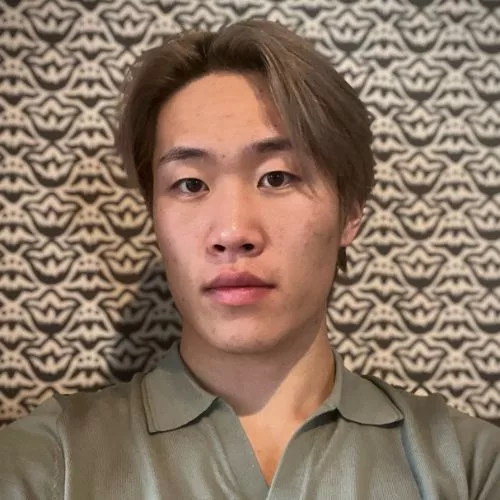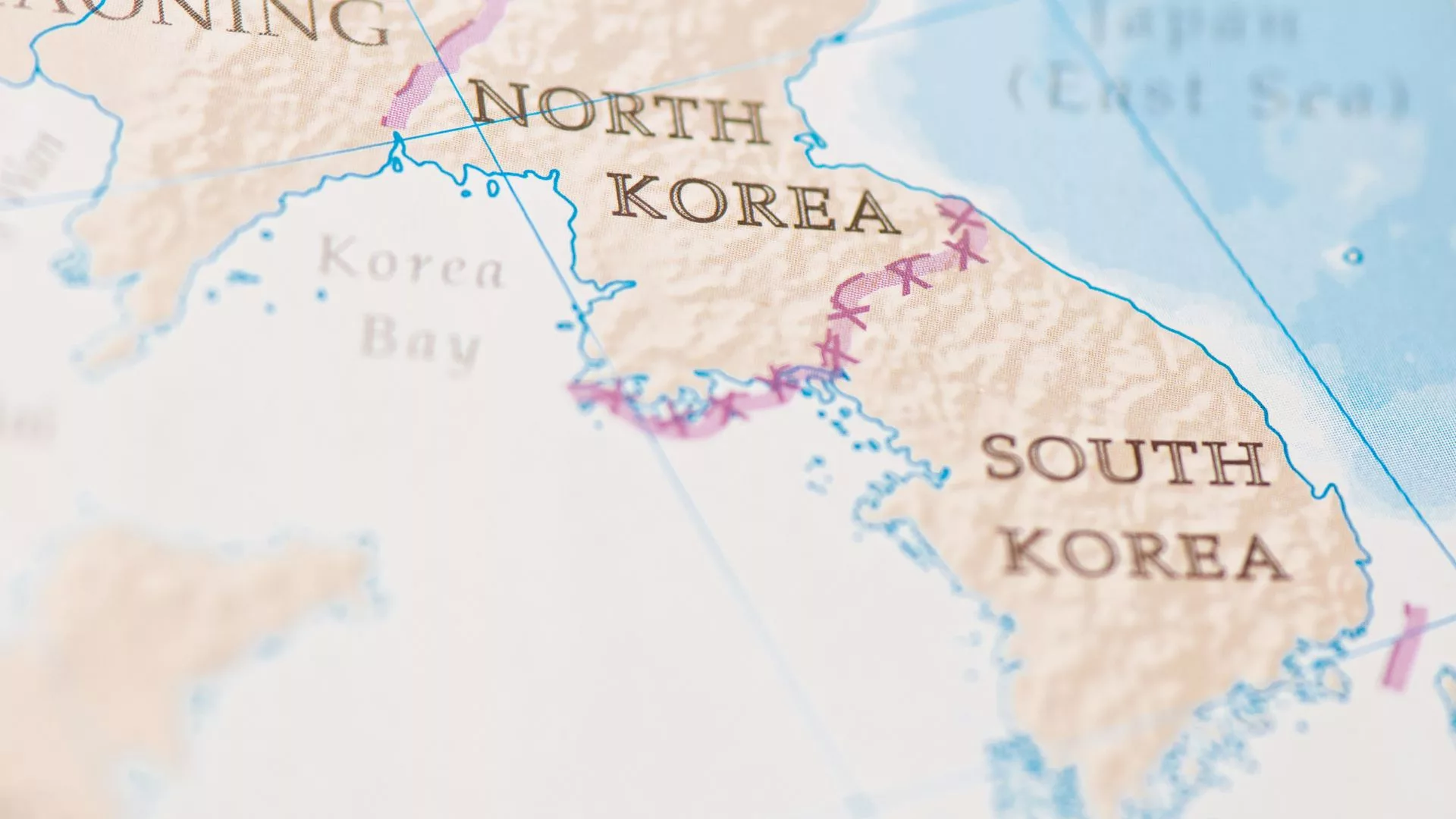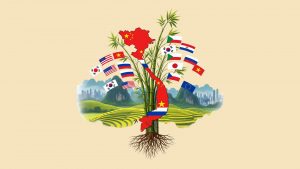From Sensationalism to Support
During the summer of 2023, I had the privilege of visiting Seoul, South Korea, and while there, I interviewed a representative of the People for Successful Corean Reunification (PSCORE) and a North Korean defector. I was also able to visit the Demilitarised Zone (DMZ) as well as a number of historical sites, allowing me to investigate the culture through self-immersion. A brief breakdown of my interviews follows:
PSCORE:
Upon contacting PSCORE, there was a clear connection between my research and their goal as an institution. They work to give a voice to the defectors through unfiltered means, differentiating the person from their past as a defector. I met with one of their English officers, and he discussed the emotions that defectors frequently experienced: isolation and confusion, and how they are frequently discriminated against because of their accents and background. This
stress around language can carry over to language learning. The English officer, as the interviewee, was keen to highlight the issue of foreign reporters being unable to speak Korean and thus unable to report on the serious reality of defecting accurately and sensitively without a translator.
The interview made it clear to me that a different approach to reporting on this topic is fundamental to supporting this institution and other non-government-funded organisation’s efforts to assist new and existing defectors.
Interview with Miss Park:
I found Miss Park through persistent attempts to reach out online. Upon meeting her, I became aware that she had likely met with people curious about her history in North Korea more than she may have liked, so I was conscious of creating a less transactional interview. I utilised a friendlier tone and incorporated what I had discerned from my interview with PSCORE. I wanted to engage with the person behind the defector stereotype, and as she recounted her experience, the reality of the situation struck me and I became less of a bystander.
We discussed things I already researched and was acquainted with, but to hear her retell her journey and give her outlook on life post-defection was encouraging. It made me curious about what happens to those who do not have the means to successfully integrate. The bravery she communicated was remarkable. She did not hold any grudges or demonstrate any animosity towards her home country; instead, she wished for the reunification of North and South Korea.
From my time in Seoul, I began to recognise that recent history and media have often distorted the presence of defectors and made them political tools. My research online was contradictory to my in-person interviews. These are real people who have to deal with the harsh realities of what is said about and done to them, whether it is true or false. I hope that the following article can visualise the distortion and biased approach that the Eastern and Western media apply to North
Korean defectors. I will explore the multifaceted reality by examining the sensationalised and politicised representations of Western media and the challenges of defection and integration with geo-political affairs as a backdrop.
Sensationalised Representations
The depiction of North Korean defectors can stray into sensationalism. Korean films and television shows, such as “Squid Games” (2021) and “Joint Security Area” (2000), have influenced the global outlook on North and South Korea. However, in these films North Korean defectors are presented as one-dimensional characters that play into stereotypes of depravity and apprehension. This may be coincidental or perhaps due to narrative decisions, but it is nevertheless worthy of discussion. In “Squid Games,” the female character of Kang Sae-byeok is identified as disconnected and cold; she participates in the games in hopes of being able to support her brother, the only family she has since they left North Korea. In “Joint Security Area,” the North Korean characters are humanised in the beginning, but that compassion is
withdrawn at the end, and the viewer is left feeling speculative.
Some South Koreans have identified the portrayals as ‘overly sympathetic’ towards the North. Recognising that the relations between the North and South are strained as the war is still ongoing, the sensationalised characteristics can be interpreted as playing into propagandist rendering, trivialising the deathly serious plight of defectors. These approaches distort the complex identities of the defectors and their realities. By marginalising the individual stories, the identities of the defectors are overshadowed, and their nuanced experiences are washed over with broad strokes of oversimplification and even satire. This portrayal is supported by Western media, which consumes these ideas and propagates unquestioned, erroneous depictions worldwide. To deviate from this recognised reality would benefit defectors everywhere, but would that imagery be accepted when North Korea has been so demonised?
Politicisation
The politicisation of North Korean defectors in Western media can take various forms. Some examples of how this manifests are:
- Oversimplification: Media coverage in the West often sensationalises the stories of North Korean defectors. “In Order to Live,” written by Yeonmi Park, is an autobiographical tale of her escape and journey leading to sanctuary. The novel fulfils Western fears of communist society by focusing on the most dramatic aspects of her escape and life in North Korea. The story is simplified, and the true reality is obscured by the apparent impossibility of such a reality. Her work is ground-breaking and brings a slice of reality to Western media, but her sincerity has been tampered with by publishers and advertisers to ensure that the corruption of North Korea is the key takeaway from the read. Oversimplified portrayals of North Korea as a totalitarian dystopia and the defectors as spy-like characters evading the villain highlight the political stance of the countries they are produced in.
- Use in Political Rhetoric: Defectors’ stories are used to criticise and demonise the North Korean regime. While criticism of the regime’s human rights abuses is warranted, such narratives can be co-opted to justify aggressive foreign policy stances and military actions by international governments. This usage can strip defectors of their agency, reducing their stories to mere tools in a political agenda. For instance, the focus on dramatic escape stories and the depravity of life in North Korea has overshadowed the systemic issues within South Korea that have led to many defectors wishing to return to North Korea. Although this reaction has been more recently reported on by certain news outlets, the issue remains that the voice of defectors is shaded by third-party reporters and those who appropriate their voices to push their own agenda.
- Selective Coverage Based on Political Climate: The intensity and nature of coverage of North Korean defectors can vary based on the current political climate or relations between North Korea and Western countries. During periods of heightened tensions, defectors’ stories may be more prominently featured as part of a broader narrative of North Korea as an active threat. Stories of defectors fleeing from political persecution are especially poignant to this portrayal. In times of diplomatic engagement, similar stories might receive less emphasis, reflecting the changing priorities of Western media outlets.
These examples illustrate the complex interplay between media representation, political agendas, and the real experiences of North Korean defectors. It’s important for media consumers to critically assess the sources and motivations behind the stories they encounter. I recommended seeking out narratives that provide a more nuanced and comprehensive understanding of North Korean defectors and their experiences, or at least engaging with research and articles with a more critical perspective.
The Challenges of Defection and Integration
The journey from North Korea is extremely dangerous, risking capture and repatriation, defectors then face the daunting challenge of attempting to assimilate into a vastly different world with nothing to identify them or help them pave the way. Issues of employment discrimination as they face the social stigma of being labelled a defector, along with grappling with language and accent barriers are prevailing issues. Despite governmental and nongovernmental efforts, such as South Korea’s resettlement programmes, many defectors confront isolation, identity crises, and mental health struggles that stem from their traumatic escapes and the pressures of adapting to a new environment. This complex transition underscores the need for comprehensive support systems that address not only the logistical but also the emotional and psychological aspects of resettlement.
I have presented how the lives of defectors have been sensationalised and politicised for the benefit of Western and South Korean governments and media sources, while the challenges of defection and integration go unseen. It is vital that moving forward, we strive for a more nuanced understanding of defectors’ lives.
The Politics of Perception
In this half of the article, the focus is on how we can dispel such misconceptions and paint a more humane picture of defectors across the globe. I will do this by examining international responses and the geopolitical context of this situation as well as the role of nongovernmental organisations (NGOs).
Dispelling Misconceptions
Misconceptions about North Korean defectors are extensive; as we have outlined in the first half of this article, they are fuelled by sensationalism and politicised media coverage. Contrary to the general belief of total indoctrination, many North Koreans are acutely aware of the oppression placed on them by their government and that the outside world experiences something more like ‘freedom’. The notion that defection is motivated solely by an individual’s experience of the political climate overlooks the economic desperation that compels many to flee. Moreover, the assumption of a warm welcome in South Korea fails to acknowledge the social, economic, and cultural hurdles that defectors face. To dispel these illusions, it is necessary to outline the political positioning of North Korea on the global stage.
Geopolitical context and international response
The experiences of North Korean defectors are inextricably linked to the geopolitical landscape of East Asia and the international community’s stance on North Korea. The country boasts strategic yet strenuous relationships, most notably with China and Russia as well as African nations such as Uganda and Nigeria. Fear of their nuclear weapons and their continued cyber provocations assures that the international audience remains cautious. North Korea’s contentious position on the global stage greatly influences both the journey of defectors and the international responses to their predicament.
- China, as North Korea’s most significant ally, is an economic lifeline to the nation; it also plays a central role in the treatment of North Korean defectors. Sharing a border, many defectors pass onto Chinese land in attempts to escape. The Chinese government lists these defectors as ‘economic migrants’, a policy unaligned with what is considered the norm in the West. Many recognise the term ‘asylum-seekers,’ which I feel is more appropriate. The label migrant suggests that the defectors chose to leave freely, and that fear of persecution and death was not part of their decision to leave.
Arguably, this infringes upon international refugee conventions, exposing defectors to severe risks upon their forced return. Human Rights Watch and other organisations have documented the harsh penalties defectors face upon repatriation, including imprisonment, torture, and, in extreme cases, execution. - Russia, while less frequently mentioned in the context of North Korean defections, maintains a complex relationship with the country. It has been reported by the New York Times that North Koreans have been employed in Eastern Russia, working labour-intensive jobs. The work of these North Korean nationals contributes to the economies of both nations.
This kind of labour agreement has been criticised by the United Nations, as this relationship underscores the complicity of some international actors in the face of North Korea’s repressive practices. This apparent incitement only serves to suppress defectors’ pleas to international institutions.
International Response and Diplomatic Efforts
The international response to the ever-continuing North Korean human rights crisis and the issue of defector settlement is multifaceted, involving a range of players from national governments to international organisations and NGOs. The United Nations has repeatedly condemned the human rights abuses in North Korea, with reports from their Human Rights Council detailing the regime’s violations and calling for accountability. However, the effectiveness of these condemnations is limited by geopolitical considerations and the reluctance of powerful nations to push too hard against North Korea for fear of destabilising the region or derailing sensitive diplomatic negotiations.
South Korea stands out for its direct support of North Korean defectors. Their Ministry of Unification’s resettlement programmes provide a pathway for integration and support that is unique to the international arena. The Hanawon facility in Gyeonggi Province, for instance, offers a comprehensive three-month program designed to help defectors adjust to life outside of the regime. The programme includes psychological counselling, vocational training, and
education on South Korean society. PSCORE is another example, especially aiding women
and children in acquiring the correct legal documents. Despite these efforts, however, the challenges of integration remain significant, highlighting the need for ongoing support and understanding from the South Korean public and the international community. Is it sustainable for the international community to place defectors resettlement entirely on the
back of South Korean organisations?
The Role of Non-Governmental Organisations (NGOs) and Civil Society
NGOs and civil society play a crucial role in supporting North Korean defectors, as they offer services that range from secret escape networks through China and Southeast Asia to advocacy and awareness campaigns aimed at highlighting the defectors’ predicament. Organisations such as Liberty in North Korea (LiNK) and the North Korean Human Rights
Database Centre work tirelessly to assist defectors in their journey to freedom and to document abuses for the international community. They publish easy-to-access reports on their websites in English. The actions and efforts of these operations are vital in providing a lifeline to defectors, humanising their experience, and keeping the international focus on the ongoing human rights crisis in North Korea as context for their appeals for support.
Navigating the Complex Geopolitical Web
Now that we understand the geopolitical context and the reactions of national and international audiences, we can see that the representations and realities of North Korean defectors sit in contradiction. Narratives presented by the media, individuals, and organisations both actively and passively dealing with the defector crisis affect detached perspectives, like those of us in the West. A shift towards a more mindful and nuanced understanding of defector experiences is essential to providing efficient support and advocating for their rights.
If you are interested in learning more about these topics, the following links provide valuable information on North Korean defectors and the work that is being done to aid them.
Database Center for North Korean Human Rights (NKDB) official website:
https://en.nkdb.org/
People for Successful Corean Reunification (PSCORE) official website:
https://pscore.org/
Liberty in North Korea’s (LiNK) official website:
https://libertyinnorthkorea.org/
Acknowledgement: Thanks to the Robertson Ness Fund and the University of Edinburgh Business School, who have helped fund my research abroad in South Korea. My gratitude extends to Miss Park and my friends at PSCORE for providing me access to first-hand accounts of North Korean defectors and directing me towards translated resources. Thank you for your valuable insights and radiating warmth. I hope we will meet again. Lastly, a great thank you to Miss I. P. Buchanan for her unwavering support and help on the article and in this ever-changing world.
Magnus is a Norwegian second year International Business student at the University of Edinburgh.







